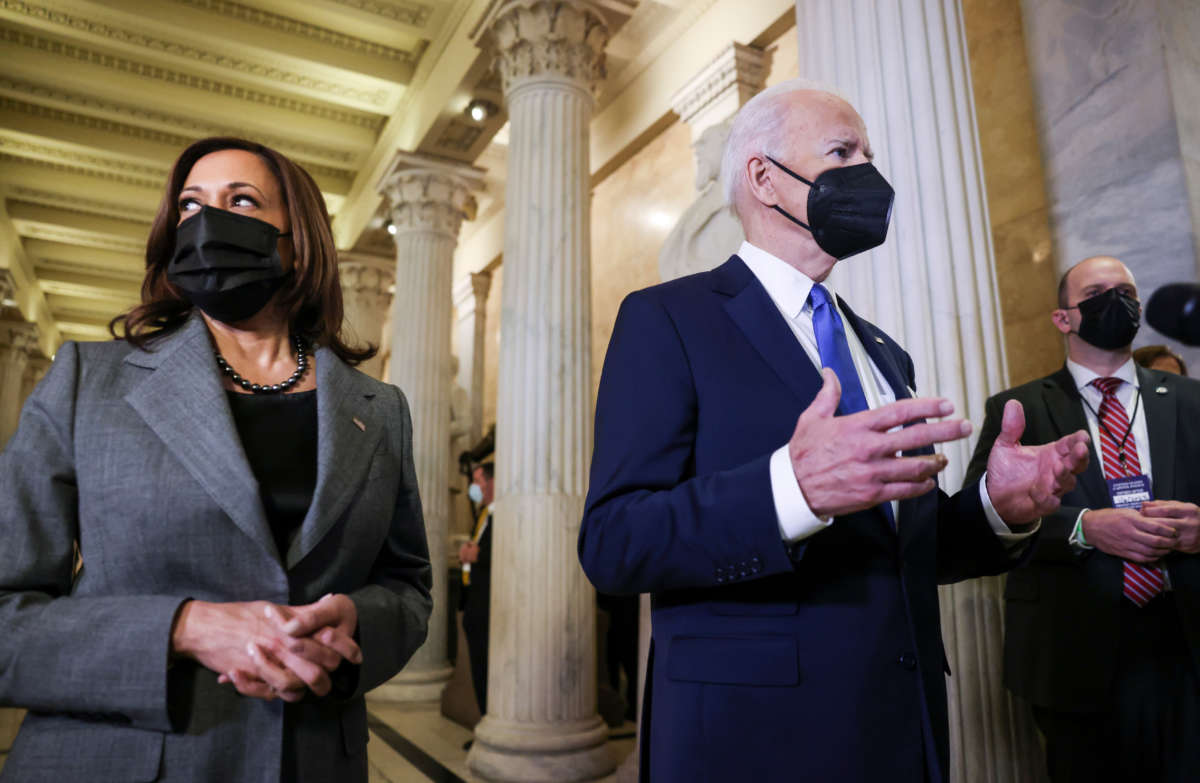Honest, paywall-free news is rare. Please support our boldly independent journalism with a donation of any size.
President Joe Biden and Vice President Kamala Harris are planning to visit Atlanta, Georgia, next week – but a coalition of voting rights organizations are telling them to stay in Washington, D.C., unless they can visit with a plan for strengthening voting protections across the U.S.
In a statement from the White House earlier this week, Biden and Harris announced that they would be visiting Atlanta on Tuesday, January 11, with the aim of promoting voting rights legislation in Congress.
Several Republican-led states across the country, including Georgia, have passed highly restrictive voting laws following former President Donald Trump’s loss in the 2020 election. Biden is the first Democrat to win Georgia in a presidential race since 1992.
In a statement released this week, a coalition of voting rights organizations said that Biden and Harris should delay their trip until they explain how voting rights legislation can be passed in a narrowly divided Congress. Several pieces of voting rights legislation have indeed failed in the Senate due to Republican filibusters.
The group suggested that any visit to the state without a plan to overcome such hurdles would be pointless, amounting to no more than a publicity stunt.
“Georgia will not be used as a two-dimensional backdrop, a chess piece in someone else’s ineffectual political dealings,” the coalition said in a statement.
They added:
Georgia voters made history and made their voices heard, overcoming obstacles, threats, and suppressive laws to deliver the White House and the US Senate. In return, a visit has been forced on them, requiring them to accept political platitudes and repetitious, bland promises. Such an empty gesture, without concrete action, without signs of real, tangible work, is unacceptable.
The groups that took part in issuing the statement include the New Georgia Project Action Fund, the Black Voters Matter Fund, the Asian American Advocacy Fund, and the GALEO Impact Action Fund, a Latinx-based organization.
The coalition said it would “reject any visit by President Biden that does not include an announcement of a finalized voting rights plan that will pass both chambers, not be stopped by the filibuster, and be signed into law.”
“Anything less is insufficient and unwelcome,” they added.
The Biden administration has not yet responded to the groups’ demand.
In a speech on Thursday recognizing the one-year anniversary of the attack on the U.S. Capitol building, both Biden and Harris emphasized the need to protect voting rights, noting that the same lies that drove Trump loyalists to attack Congress were being used to attack the right to vote in statehouses across the country.
“Right now, in state after state, new laws are being written not to protect the vote, but to deny it,” Biden said in his speech. “Not only to suppress the vote, but to subvert it. Not to strengthen and protect our democracy, but because the former president lost.”
For several months now, efforts to pass voting rights legislation have stalled due to Republican filibusters. Earlier this week, Senate Majority Leader Chuck Schumer said that Democrats would take action to change filibuster rules in the chamber unless Republicans allowed the passage of voting rights legislation.
In his statement, Schumer also connected the attack on the Capitol to the assault on voting rights.
“Much like the violent insurrectionists who stormed the U.S. Capitol nearly one year ago, Republican officials in states across the country have seized on the former president’s Big Lie about widespread voter fraud to enact anti-democratic legislation and seize control of typically non-partisan election administration functions,” Schumer said. The Senate would “take strong action to stop this antidemocratic march” by passing voting rights protection bills, he went on – even if Democrats had to change the filibuster rule to do so.
However, Schumer’s statement didn’t elaborate whether he was seeking to alter the filibuster or end it altogether.
Press freedom is under attack
As Trump cracks down on political speech, independent media is increasingly necessary.
Truthout produces reporting you won’t see in the mainstream: journalism from the frontlines of global conflict, interviews with grassroots movement leaders, high-quality legal analysis and more.
Our work is possible thanks to reader support. Help Truthout catalyze change and social justice — make a tax-deductible monthly or one-time donation today.
